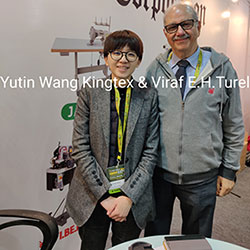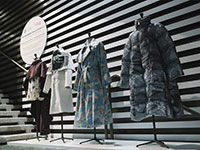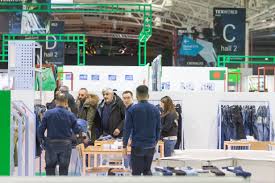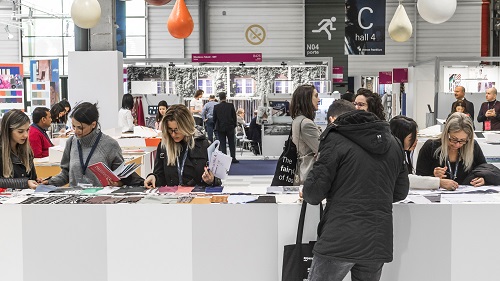FW
Banking on the growing demand for its machines, Turel Group expects 2020 to be a great year for the company.Viraf Turel, Chairman expounds on the company’s operations, future plans and the market in Ludhiana
 Unperturbed by the economic recession, the Turel Group of companies grew by 20 per cent in 2019. The company expects 2020 to also be a great year for it. “Our growth mainly comes from the jeans segment,” notes Viraf Turel, Chairman of the group. “Almost two of three Indians wear jeans as it offers them great comfort, convenience, and is also fashionable,” he adds.
Unperturbed by the economic recession, the Turel Group of companies grew by 20 per cent in 2019. The company expects 2020 to also be a great year for it. “Our growth mainly comes from the jeans segment,” notes Viraf Turel, Chairman of the group. “Almost two of three Indians wear jeans as it offers them great comfort, convenience, and is also fashionable,” he adds.
Automation for all
The company is a great proponent of automation as it believes that the customer is always looking for automation. “However, this automation should be carried out at an affordable price and it should be flexible in use,” he cautions further adding, “it should be useful to all customers and not restricted to any particular product.”
Multiple employment opportunities
Technology is not stealing jobs. There are multiple jobs available in the industry. “However, people don’t like to work as garment operators. They want a hygienic and comfortable factory environment that is also free from dust and noise pollution, has a five day work culture and is free of supervisors screaming at the operator. This is where automation helps,” adds Turel.
Turel is very optimistic about the Ludhiana market. Though imports from Bangladesh are a problem, the Ludhiana market is quite enthusiastic. “We are receiving quite a few inquiries for automatic machines and labor saving devices from this market,” adds Turel.
"International menswear show Pitti Uomo, held from January 7 to 10, 2020 in Florence's Fortezza da Basso, launched many new collections for F/W 2020-21. Though the show started on a slower note, its second and third days were busier and livelier, and hosted more number of visitors"
 International menswear show Pitti Uomo, held from January 7 to 10, 2020 in Florence's Fortezza da Basso, launched many new collections for F/W 2020-21. Though the show started on a slower note, its second and third days were busier and livelier, and hosted more number of visitors.
International menswear show Pitti Uomo, held from January 7 to 10, 2020 in Florence's Fortezza da Basso, launched many new collections for F/W 2020-21. Though the show started on a slower note, its second and third days were busier and livelier, and hosted more number of visitors.
Bright and energetic hues such as orange, red and bordeaux tones along with blue and military green hues dominated the show which also saw a return of the military and workwear fashion alongwith traditional woolen fabrics such as checked, houndstooth or tweed effect fabrics. Sheepskin gained popularity as an inner layer or as coats and jackets particularly for brands like Ten C and Closed x Nigel Cabourn, etc. Mixed with technical and different surfaces, metallic hues, technical played an important part in the collections of brands such as Mackage, RRD, Fila, Blauer. The most innovative items displayed were the newly developed eco-friendly and sustainable items.
Jackets made with eco-friendly materials
Jackets made of graphene were one of the most innovative developments at the event. These jackets are known to last longer as graphene is a good conductor of heat and made from Carbonium, a heat resistant material. Brands using this material include Woolrich, which has launched a jacket made of graphene fibers and padded with it.
Similarly, Italian brand Esemplare launched a zero signal jacket made with recycled nylon that is also padded with thermore thermal booster, a smart thermo-regulating padding. Newborn outer jacket brand Replumè launched jackets made with Pure, a padding made with recycled, sterilised-in-Italy and certified down. Swedish brand Houdini Sportswear launched a collection made with recycled, biodegradable and recyclable materials. Danish brand Knowledge Cotton Apparel presented a collection produced using 100 per cent sustainable methods and materials.
New manufacturing techniques on display
The show also launched Uyn, a unique 160-gram sneaker made by a special 3D knitting one-piece technique n 100 percent merino wool, and injected with a recyclable polyurethane sole.
Similarly, Lotto showcased new sneakers collection with H-Dry, a water-resistant breathable membrane, while Trussardi presented Beautiful Minds, a new course for the brand led by a series of new creative talents. United Standard launched a new collection inspired by workwear and reinterpreted its iconic greyhound logo.
The Closed x Nigel Cabourn capsule redesigned the items originally created by the Girbaud duo to add a new twist to its unisex, men's and women's collections.
Eco-friendly denims on display
Denim brand Hand Picked launched eco-friendly products. Hand Picked launched a denim collection made from bio-cotton and recycled cotton along with stretch fibers obtained from recycled PET. Another denim brand Peppino Peppino launched a collection of rinsed denims with back labels in Viridis, a sustainable corn-derived material. In addition, the brand launched a ozone treated collection that is made without using permanganate or chemicals.
Events at the show
The show also hosted many events such as celebration of the 20 years of Blauer and FGF’s launch in the European market. The brand, led by entrepreneur and designer Enzo Fusco, presented Human Landscapes, a multimedia installation curated by art director Felice Limosani.
Woolrich celebrated its 190th’s anniversary by presenting ‘The Ultimate Woolrich Experience’, an installation that showcased the evolution of the brand after its recent acquisition by L-Gam investment fund. Other events included the Rolf Ekroth & Terinit presentation which mixed a snowboarding culture with cyber punk, science fiction and military. The event, directed by Rolf Ekroth was presented by Swedish brand Terinit. Sergio Tacchini's event "Impossible Angle" also mixed the brand's tennis roots with the hip-hop theme from the '80s and '90s. The show ended with the K-Way fashion show which focused on reinventing its iconic windbreaker that is currently experiencing newfound success.
Emphasizing on sustainability, COTTON USA showcased WHAT’S NEW IN COTTON™ to the global home textile industry at its booth at Heimtextil in Frankfurt, Germany, from January 7th to 10th 2029.
“U.S. cotton’s sustainability provides COTTON USA with a unique selling point, particularly with the development of the U.S. Cotton Trust Protocol,” CCI Executive Director Bruce Atherley said. “U.S. cotton is a raw material that is leading the way in terms of sustainable practices – something that global brands now demand from their suppliers. The U.S. Cotton Trust Protocol is committed to raising the bar for responsible, sustainable farming methods.”
The new U.S. Cotton Trust Protocol is a tangible and transparent snapshot of U.S. cotton growing practices and the gains in sustainability standards resulting from them.
COTTON USA also invited attendees to visit the booth to learn about its collaboration and sourcing opportunities with leading brands and retailers around the world, as well as how to license the COTTON USA Mark, which quantitative consumer research proves is of high value to consumers and can drive both preference and higher prices.
At Heimtextil, one Chinese mill, which annually consumes 1,000 tons of U.S. cotton, joined the COTTON USA licensing program. Nine additional companies from Europe and Asia expressed interest in becoming COTTON USA licensees.
Ed Filipowski co-chairman of New York-based public relations agency KCD, has died at his home in New York after complications following a recent surgery.
“I will always remember the kindness Ed showed to me in the very early days of BoF, giving constructive feedback and advice, encouraging me to stay true to my voice and providing valuable access and opportunities to create meaningful stories,” said BoF’s founder Imran Amed. “All of us at BoF will remember him fondly and offer our deepest condolences to his loved ones and the KCD team. His spirit and keen eye for talent will live on in their dedication to our industry.”
An amazing orator of powerhouse fashion PRs, Filipowski supported the industry’s transformation from a loose network of independently run brands into a global business driven by multinational conglomerates. Throughout his career, he worked to help shape the careers of John Galliano, Donatella Versace, Tom Ford and others.
Born outside of Pittsburgh, Filipowski earned a journalism degree from Northwestern University and moved to New York in the early 1980s. He met the publicist Kezia Keeble just a few years later, eager to work at her hip PR agency, which repped brands like Stephen Sprouse and the of-the-era retailer Charivari. “It all goes to back to Kezia,” Filipowski told BoF in 2016.
The announcement was made today during the 2020 Beltwide Cotton Improvement Conference, which convened as part of the National Cotton Council-coordinated 2020 Beltwide Cotton Conferences. Jones, who has devoted his 35+ professional years to plant breeding and genetics, received a plaque and a monetary award.
Since 2009, Jones has been instrumental in the development and collaborative release of more than 50 public germplasm lines resulting in six cultivars. Of those six, two have exceptional fiber quality traits that are valued by the market and that help to maintain cotton’s competitiveness.
Jones led the development of a Universal Material Transfer Agreement that helped protect the intellectual property of public cotton breeders/institutions and later private seed companies who were willing to abide by the Agreement.
He also spearheaded efforts to identify cotton fields with appropriate levels of Fusarium wilt race 4 (FOV4) infection and coordinated the first nationwide screen for resistance – an effort that identified 11 breeding lines with possible resistance to this upland cotton production disease threat.
The author of 74 peer-reviewed publications in the past decade, Jones received the 2017Special Service Award from Texas A& M University and the 2019 Agronomic Industry Award from the American Society of Agronomy.
Jones earned his B.Sc. and M.Sc. in Agronomy from the University of Tennessee and his Ph.D. in Plant Breeding and Genetics from the University of Nebraska. Prior to joining Cotton Incorporated in 2003, he was a research scientist at Syngenta and then Monsanto.
The 5th edition of GMMSA Expo India 2020, organised by Garments Machinery Manufacturers and Suppliers Association (GMMSA), was held from January 03-06, 2020 at Ludhiana.Narinder International, one of the major machinery suppliers from Ludhiana, was a major participant at the expo. Narinder Kumar, Director of the company reveals about the products launched by the company at the expo and the current industry scenario.
 One of the major participants at the GMMSA expo, Narinder International is one of the major machinery suppliers from Ludhiana. The company manufactures and supplies a wide range of machinery like the flat knit machines, circular knit machines and accessories like knee caps. “We are also involved in the upgradation of blankets and high pile fabrics,” reveals Narinder Kumar, Director of the company.
One of the major participants at the GMMSA expo, Narinder International is one of the major machinery suppliers from Ludhiana. The company manufactures and supplies a wide range of machinery like the flat knit machines, circular knit machines and accessories like knee caps. “We are also involved in the upgradation of blankets and high pile fabrics,” reveals Narinder Kumar, Director of the company.
This time at the expo, the company launched two new products; the super soft fur and the rabbit fur which is used for making car seats, carpets and curtains. “This is our fifth participation at the expo. The platform keeps us abreast of new technologies, machines and products launched across the world. This not only reduces our labor and production costs but also increases our efficiency and productivity,” states Kumar further informing that last year over 20,000 people visited GMMSA.
Heavy expenditure, secondhand machines pose challenges
Elaborating on the current industry scenario, Kumar says, “The knitting industry is doing very well in India as Chinese imports are declining. Our country is likely to emerge as one of the major machinery suppliers in the future.”
Manufacturing machines is a cumbersome process as it involves heavy expenditure. “It is difficult to make spare parts, assemble and market them. A single person can’t do this. The main machinery has to be made in one place after which people can give orders for making the spare parts. We then assemble these parts and start making the machines,” adds Kumar.
Another big challenge is the flood of secondhand machines in the industry. As buying a second hand machine is cheaper than buying a new machines, it does not encourage local manufacturing in India. “However, the scenario is different in China. The country does not allow the import of second hand machines as there are many companies involved in assembling and manufacturing machines. Many others have also banned such imports,” adds Kumar.
 Texworld Paris, international offer of fabrics, supplies and accessories through nearly 750 exhibitors from more than 25 countries. There is always a new player in cotton, wool, linen and silk notably from China, India and Korea. An exceptional offer is also expected from the print and jacquard sectors, which contains a lot more exhibitors than usual.
Texworld Paris, international offer of fabrics, supplies and accessories through nearly 750 exhibitors from more than 25 countries. There is always a new player in cotton, wool, linen and silk notably from China, India and Korea. An exceptional offer is also expected from the print and jacquard sectors, which contains a lot more exhibitors than usual.
Premiere for this February 2020 edition the creation of a Turkish pavilion of about thirty companies on more than 500sqm2, to focus on the potential of the country's industry, driven by a great knowledge of the habits and customs of the industry of its neighbor Europe. A must for many brands! This Turkish pavilion, organized in collaboration with the Istanbul Chamber of Commerce, will be located in Hall 2 near the Elite and Denim sectors. It will gather an offer composed by 70% of new companies, represented in many sectors: Drapery, Knit, Silky aspects, Prints,
Shirting, Woolen, Embroidery & lace, Functional fabrics without forgetting the Turkish companies outside the pavilion, fifteen of them have joined the sustainable sourcing itinerary, thanks to a certified sustainable offer. Turkey will also be well represented in the ELITE sector, with some fifteen companies, 3 of them are exhibiting on our shows for the very first time.
itinerary, thanks to a certified sustainable offer. Turkey will also be well represented in the ELITE sector, with some fifteen companies, 3 of them are exhibiting on our shows for the very first time.
Return of the Indian group Texprocil, which will present about thirty companies in the Cotton, Silk, Embroidery & Lace, Linen & Hemp, and Drapery & Tailoring sectors - also represented in the sustainable sourcing itinerary! Since its inception in 1954, as an autonomous non-profit organization dedicated to export promotion, the Cotton Textile Export Promotion Council, known as TEXPROCIL, has been the international face of India's cotton industry, facilitating exports around the world. Texprocil has a membership of about 3,000 textile manufacturing and exporting companies, and connects international buyers with appropriate suppliers according to their specific needs.
Talking about South Korea it keeps showcasing a growing number of companies through a pavilion organized by the Korean Textile Centre (KTC) and the Korean Federation of Textile Industries (KOFOTI). It will bring together around fifty companies with a strong focus on research & development, offering extensive ranges in Knit, Jacquard, Embroidery & Lace, Silky Aspects, Cotton, Sportswear & Functional Fabrics, Silk, and Woolen Material.
Hélène Valade is the new environment development director at LVMH. Her mission will be to stand up for the improvement of the environmental performance of all of the company’s products, to deploy the highest standards in all its supply chains, to improve the key environmental effectiveness indicators in all of its production sites and to ensure CO2 emissions are reduced.
A graduate of the Paris Institute of Political Studies, Valade began her career at the Institut français de l'opinion publique (IFOP) before being hired by French utilities and waste management group Suez in 2005. Until 2014, she was sustainable development director of the group’s water supply company Lyonnaise des Eaux, and was then appointed Suez’s vice-president of sustainable development. Since June 2018, she has also been the president of CSR watchdog ORSE (Observatoire de la responsabilité sociétale des entreprises), and is a director of environmental advisory agency ADEME.
LVMH is a French luxury group. It boasts the largest market capitalization of any company in France. In the current climate of geopolitical and economic instability, creativity and quality, the group’s founding values have become benchmarks. The increasing digitalization of its activities reinforces the quality of the experience it brings to customers. Its largest division is of fashion and leather goods.
L Brands’ sales fell 4.07 per cent over the holiday period. Comparable sales for the period fell three per cent. Victoria’s Secret continued to be the main source of the parent company’s financial woes in November and December, posting a 12 per cent decrease in comparable sales over the holiday period. These plummeting revenues were offset somewhat by an increase of four per cent at Bath & Body Works. Year to date net sales fell 2.76 per cent compared to the prior-year period, while comparable sales for the 11-month period decreased two per cent.
Bath & Body Works was left to pick up the slack with a five per cent increase in comparable sales against a nine per cent decrease at Victoria’s Secret. The iconic lingerie brand, which has failed to adapt to changing consumer attitudes, has continued to prove a problem for L Brands this fiscal year. In the light of its disappointing performance during the holiday period, L Brands has revised down its outlook for fourth-quarter earnings per share.
L Brands has been focused on diversification of its supply chain over the past five years. The company has been in negotiations with its Chinese suppliers to take costs out of the production chain to offset the increases, but that also means leaving a little bit on the table so vendors don’t end up seeing their businesses fail.
QuickFree, a zipper developed by YKK, has won the Good Design award. Founded in Chicago, the Good Design Award is among the oldest and most prestigious global award program for design excellence and design innovation. The award honors both product and industry leaders in design and manufacturing that have chartered new directions for innovation and pushed the envelope for competitive products in the world marketplace. One of the main factors for the awards selection is whether a product can enrich society and people’s lives through its design.
QuickFree, a zipper developed by YKK, promotes safety, security, and a sense of independence and accomplishment in small children. They can open and close clothing alone through the zipper’s improved function. By improving the zipper’s visibility through changing the shape of the slider and widening the area into which the pin is inserted, YKK has reduced the possibility of the pin being inserted into the wrong part of the slider. Moreover, when a certain load is applied to the left or right of the zipper, the slider snaps off with a releasing function that allows the zipper to open without lowering the slider, thereby reducing the possibility of the clothing putting pressure on a child’s body, such as when the child’s clothing get caught on playground equipment.












